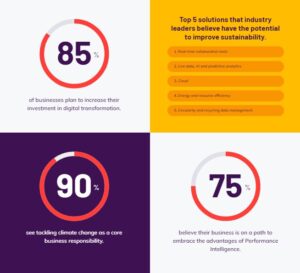AVEVA’s new research has revealed that 85% of businesses plan to increase their investment in digital transformation over the next three years in order to tackle climate change, embrace automation and unlock the performance benefits of advanced technologies.
 The findings were drawn from an AVEVA-commissioned survey focused on innovation priorities of senior industry leaders and managers.
The findings were drawn from an AVEVA-commissioned survey focused on innovation priorities of senior industry leaders and managers.
AVEVA surveyed over 850 digital transformation experts across industries such as manufacturing including large-scale agribusiness and food and beverage, infrastructure, energy, power and chemical processing. The objective was to understand the different market opportunities, pressures and innovations driving industries to embrace digital operations, using a combination of AI, industrial software and human insight to deliver unprecedented performance.
“Industrial leaders are leveraging advanced analytics and digital innovation to rethink how they design, engineer and operate,” said Ravi Gopinath, Chief Strategy Officer and Chief Cloud Officer, AVEVA.
“Bringing together rich, timely and accurate industrial data with the scope and scale of the cloud, smart analytics and artificial intelligence (AI) are empowering industrial teams to collaborate better, operate with agility and elevate what they can achieve. This is set to transform how we all live and work.”
Digital acceleration, driven by the pandemic
Nine out of ten industrial companies see combining advanced technologies such as the industrial internet of things (IIoT), AI and cloud with their teams’ insights, as key to driving better performance in a post-pandemic world. AI and automation are now seen as necessary technologies in order to keep pace with competitors. In China and Germany, more than half (56% and 55% respectively) have made digital transformation their top priority over the coming year, with investments focused on workforce solutions, cyber security, connected worker strategies and cloud.
Tackling Climate Change Through Digital Transformation
The pandemic has increased focus on the need for urgent climate action and the majority of industrial enterprises (90%) cite this as a core action area. Nine in ten (89%) are committed to achieving net-zero carbon emissions across their businesses and to tackling climate change within a five-year time horizon. Indeed, focus on sustainability has become a prerequisite for success in industry, leaders affirmed.
Sustainability-led demands will consequently drive innovation across the value chain, 85% of companies say. These companies are planning to increase visibility and performance assurance to sustainability related metrics as a result. Germany, Austria and Switzerland lead the global race for environment-linked business innovation: 47% in these countries see it as a significant focus, as opposed to 41% worldwide.
About 80% of industrial companies are focused on meeting or exceeding environmental regulations, while 83% say they will prioritise the transition to renewable energy sources. Supporting circularity and recycling within the value chain is important for 83% of customers, led by Latin America (44% of companies).










Discussion about this post